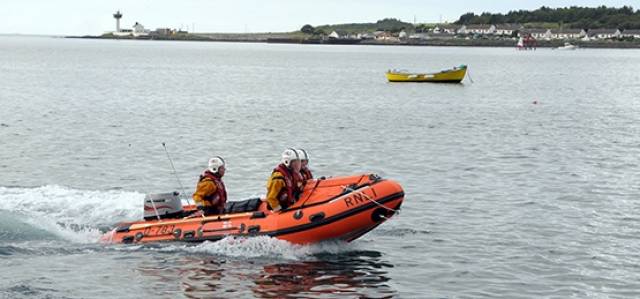Volunteer lifeboat crew at Larne RNLI responded to a launch request from the UK Coastguard yesterday evening to help search for three overdue divers near Blackhead Lighthouse.
The initial alarm was raised at 5.30pm to report three divers who were 40 minutes overdue. Larne All-weather lifeboat launched followed by Larne inshore lifeboat and the crews were quickly on scene in the Blackhead Area to commence the search. The major multiagency search was coordinated by the coastguard and included Bangor RNLI, the Irish Coast Guard helicopter Rescue 116, four shipping vessels, two boats from Whitehead Yacht club and Larne, Portmuck and Bangor coastguard teams.
The weather conditions of calm seas with thick banks of rolling fog caused poor visibility and challenging search conditions.
Larne RNLI inshore lifeboat located the three divers at 6.50pm on a cliff face north of The Gobbins. The divers were recovered into the lifeboat and did not require medical assistance however they were fatigued, hungry and thirsty. Larne All-weather lifeboat then took the divers onboard and transferred them safely back to Belfast Coastal Operations Centre in Bangor.
Larne RNLI Operations Manager Allan Dorman said 'Conditions were very challenging with visibility down to about fifteen metres. The divers did the right thing and stayed together. We were fearful as time passed and our lifeboat crews were still searching the area with no sightings but thankfully the tide took them north and to nearby rocks. They were exhausted when they were finally located and recovered onto the inshore lifeboat. We are extremely thankful that the callout ended well with everyone accounted for and safely recovered. Our thanks to everyone involved in the search.’
UK Coastguard adds:
Three divers found safe after extensive UK Coastguard search and rescue operation
UK Coastguard coordinated the search and rescue operation for three divers this afternoon who were located by the Larne RNLI inshore lifeboat after nearly two hours in the water.
At 5.30pm today (8 June) UK Coastguard received a call from the coxswain of a RHIB (rigid hulled inflatable boat) dive boat reporting that three divers were 20 minutes overdue from their dive in the area of Blackhead, Belfast Lough.
A Mayday emergency broadcast was issued to alert all shipping vessels in the area and the Ballycastle, Bangor, Larne and Portmuck Coastguard Rescue Teams, the Irish Coastguard helicopter, Bangor RNLI inshore lifeboat and Larne RNLI all weather and inshore lifeboats carried out an extensive search. Four commercial vessels, two fishing boats, a yacht and four RHIBs from the Whitehead Yacht Club responded to the Mayday broadcast and joined the search efforts.
The crew of the Larne RNLI inshore lifeboat spotted the three divers nearly three miles from their original dive location. They were safely put onto the boat and taken to the Bangor Marina where they were met and given safety advice by the Bangor Coastguard Rescue Team. They required no medical treatment.
Ryan Gray, Senior Maritime Operations Officer for the UK Coastguard said: ‘The coxswain of the RHIB dive boat did exactly the right thing calling the UK Coastguard when it became apparent that the divers were overdue. Although we had very heavy fog in the area which reduced visibility, these divers were extremely experienced and had an emergency plan in place when they found themselves in difficulty. It was a very challenging search operation given the weather conditions, however, the divers’ professionalism and the fact that they stayed calm and stuck together, meant that we were able to locate them quickly. They had all the right equipment to cope with this situation and we are extremely glad that they were found safe and well.
‘We would like to extend a massive thank you to all those who reacted quickly to the Mayday broadcast that was issued. It was truly a coordinated effort and everyone did a fantastic job to bring these divers home safely.’
Mr Allan Dorman Larne, RNLI Lifeboat Operations Manager said: ‘Conditions were very challenging with visibility down to about fifteen metres. The divers did the right thing and stayed together. We were fearful as time passed and our lifeboat crews were still searching the area with no sightings but thankfully the tide took them north and to nearby rocks. They were exhausted when they were finally located and recovered onto the inshore lifeboat. We are extremely thankful that the callout ended well with everyone accounted for and safely recovered. Our thanks to everyone involved in the search.’






























































